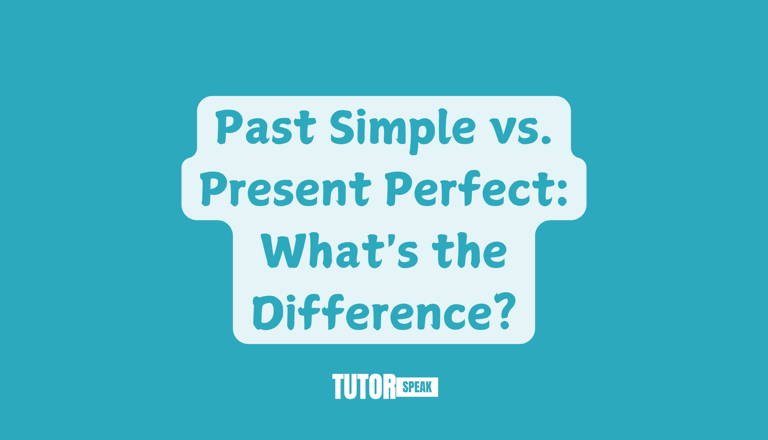Past Simple vs. Present Perfect: What's the Difference?
When learning English, it’s essential to understand the differences between the Past Simple and Present Perfect tenses. Both tenses talk about actions that happened in the past, but they are used in different contexts. In this article, we’ll break down these two tenses, provide clear explanations, give examples, and even share common mistakes with corrections. Let’s dive into how to use these tenses effectively.
TutorSpeak
3 min read


Past Simple vs. Present Perfect: What's the Difference?
When learning English, it’s essential to understand the differences between the Past Simple and Present Perfect tenses. Both tenses talk about actions that happened in the past, but they are used in different contexts. In this article, we’ll break down these two tenses, provide clear explanations, give examples, and even share common mistakes with corrections. Let’s dive into how to use these tenses effectively.
Past Simple vs. Present Perfect: Key Differences
1. Past Simple:
The Past Simple tense is used to talk about actions that were completed at a specific time in the past. This tense is used with time expressions such as yesterday, last year, in 2010, or two days ago.
Examples:
I visited Paris last summer.
They watched a movie yesterday.
She graduated from college in 2015.
Key Points:
Actions are finished and happened at a specific time in the past.
Time expressions like yesterday, last week, two days ago are often used.
2. Present Perfect:
The Present Perfect tense is used to talk about actions that have happened at some point in the past but are still relevant or connected to the present. It focuses on the result or the experience, rather than the specific time when the action happened.
Examples:
I have visited Paris. (The exact time is not important, only the experience of having visited Paris.)
They have watched a movie. (It’s not clear when the movie was watched, just that it happened.)
She has graduated from college. (The focus is on her graduation, not when it happened.)
Key Points:
It connects past actions to the present.
Used with expressions like ever, never, already, yet, and since/for.
Past Simple vs. Present Perfect: When to Use Each Tense
Here’s a breakdown of when to use Past Simple and Present Perfect:
Past Simple is used when:
The action happened at a specific time in the past.
We know exactly when the action took place.
The action is finished and has no connection to the present.
Present Perfect is used when:
The exact time of the action is not important.
The action affects the present in some way.
The action happened at an unknown time in the past or has just happened.
Common Mistakes with Past Simple and Present Perfect
Mistake: "I have visited Paris last year."
Correction: "I visited Paris last year."
Explanation: Since "last year" is a specific time, the Past Simple should be used here, not Present Perfect.
Mistake: "She didn’t yet complete her homework."
Correction: "She hasn’t completed her homework yet."
Explanation: With Present Perfect, we use hasn’t/haven’t and yet in negative sentences to express an action that hasn’t happened up to the present time.
Mistake: "They have traveled to Japan last summer."
Correction: "They traveled to Japan last summer."
Explanation: Since "last summer" is a specific time in the past, the Past Simple should be used.
Mistake: "I have lived here for 5 years ago."
Correction: "I have lived here for 5 years."
Explanation: The word ago is used with Past Simple, not with Present Perfect. Instead, use for or since in Present Perfect.
Practice Exercises
Exercise 1: Choose the correct form of the verb (Past Simple or Present Perfect).
I __________ (finish) my homework yesterday.
She __________ (never/see) that movie before.
They __________ (live) in this city for 10 years.
He __________ (arrive) at 7 pm last night.
We __________ (eat) lunch already.
My friends __________ (go) to the concert last weekend.
I __________ (just/see) your message.
They __________ (not/visit) the museum yet.
She __________ (be) to three different countries this year.
I __________ (buy) a new phone last month.
Exercise 2: Fill in the blanks with the correct form of the verb (Past Simple or Present Perfect).
I __________ (never/try) sushi before.
They __________ (arrive) at the airport two hours ago.
He __________ (not/finish) his project yet.
We __________ (go) to the beach last weekend.
She __________ (study) English for five years.
We __________ (not/see) that movie yet.
I __________ (read) that book last summer.
He __________ (just/leave) the office.
I __________ (know) her for many years.
They __________ (not/come) to the party last night.
Exercise 3: Correct the mistakes in the sentences.
I have seen him yesterday.
She did never go to that restaurant before.
They haven’t completed their homework last night.
We went to the museum this week.
I have bought a new car last year.
Exercise 4: Create sentences using either the Past Simple or Present Perfect.
I / visit / Paris / last year
she / study / English / for 3 years
we / have / lunch / yet
he / arrive / home / two hours ago
they / not finish / the meeting / yet
I / go / to the cinema / last weekend



